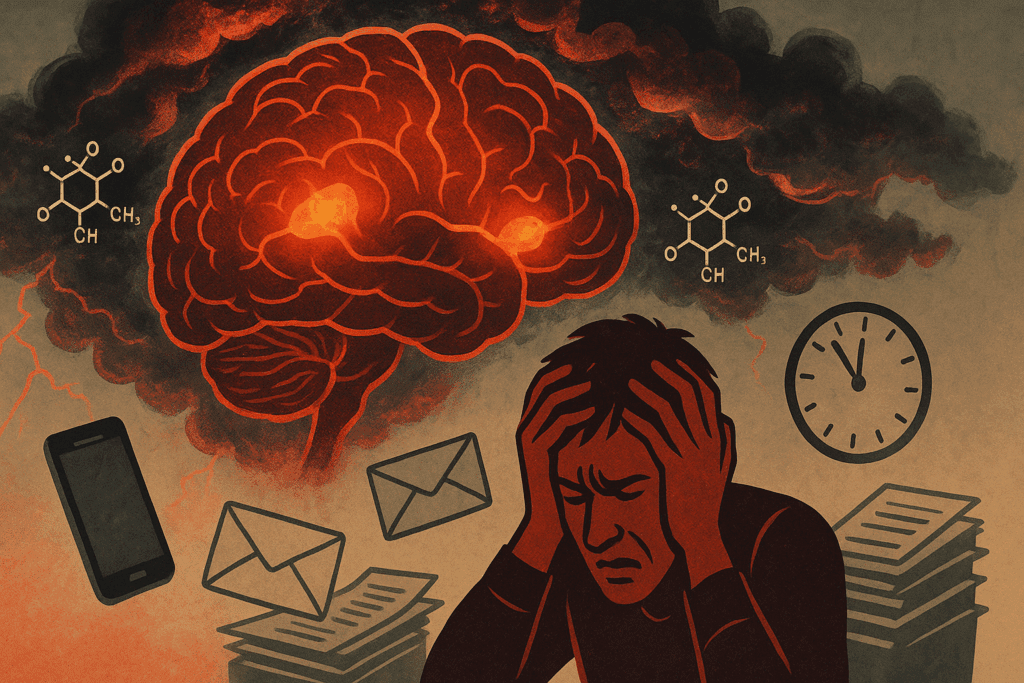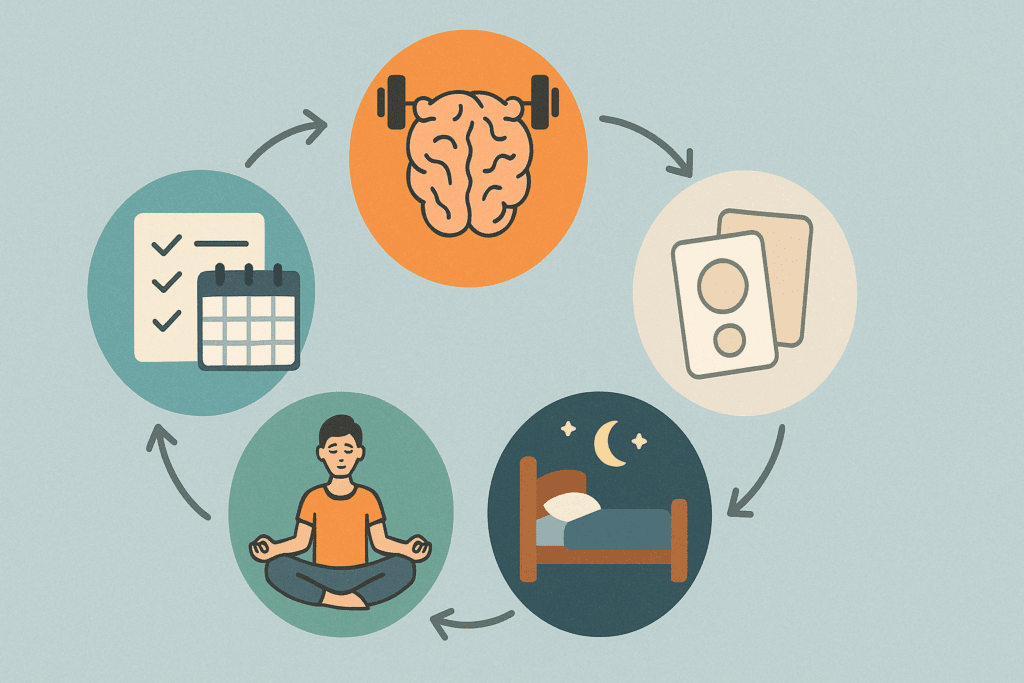Understanding the Nature of Everyday Forgetfulness
It happens to nearly everyone: you walk into a room and forget why you entered, misplace your keys for the third time in a week, or are completely blank on someone’s name mid-conversation. These seemingly minor lapses in memory can be frustrating, even worrisome, especially when they occur with increasing frequency. Many people find themselves asking, “Why do I forget things so easily?” or wondering why they are forgetting stuff easily, especially when they feel otherwise healthy and mentally capable. While forgetfulness is often dismissed as a byproduct of aging or stress, the reality is far more nuanced. Forgetting information isn’t always a sign of decline—it can reflect the way our brains are wired to prioritize and process information in an increasingly fast-paced and information-saturated world.
Everyday forgetfulness is typically associated with normal cognitive processes. The human brain receives an overwhelming amount of stimuli, and in order to function effectively, it filters out what it deems irrelevant. This natural filtration can sometimes mean that important details are overlooked or inadequately encoded, leading to forgetfulness. When someone wonders, “Why do I forget things so quickly?” the answer may lie in this delicate balance between attention and memory consolidation. If your brain never properly encoded a memory in the first place—perhaps because your attention was elsewhere—it cannot retrieve it later. In this sense, people who forget things are not called absent-minded in a clinical sense, but rather victims of cognitive overload or divided attention.
Moreover, forgetting things quickly can be a sign of mental fatigue. When the brain is constantly switching between tasks or operating under pressure, it becomes less efficient at transferring short-term memories into long-term storage. This explains why someone may ask, “Why do I always forget things at work?” or “Why am I forgetting words during conversations?”—the answer often relates to cognitive exhaustion rather than an underlying neurological issue. At a foundational level, memory is both fragile and selective, shaped by attention, relevance, and emotional significance. When these components are disrupted by external demands or internal stress, forgetfulness becomes a predictable outcome.
You may also like: What to Eat to Boost Memory: Science-Backed Brain Foods That Improve Recall, Focus, and Long-Term Mental Health

The Role of Stress in Memory Lapses
Stress is one of the most common and overlooked contributors to memory problems. When people begin to notice they keep forgetting stuff or wonder, “Does stress make you forgetful?” the answer is a resounding yes, and science backs this up. Chronic stress floods the brain with cortisol, a hormone that, when elevated over long periods, can impair the functioning of the hippocampus—the brain’s central memory processor. This disruption compromises the brain’s ability to form, store, and retrieve memories effectively. The more stressed you are, the more likely you are to experience short-term memory failures, such as forgetting names, appointments, or where you left your phone.
In high-stress environments, the mind often prioritizes survival and immediate problem-solving over encoding mundane details. This instinctual redirection of mental energy can explain why people forget things during particularly anxious or overwhelming periods. The brain essentially puts certain memory functions on hold to focus on what it perceives as more urgent. Consequently, when people say, “Why do I forget things so fast during stressful times?” it is because stress hijacks cognitive resources that would otherwise be used for memory retention. This relationship between stress and memory isn’t just psychological—it has been confirmed through neuroimaging studies that reveal changes in brain structure and function in individuals exposed to long-term stress.
Stress-related forgetfulness is not limited to major life events. Micro-stressors—like tight deadlines, lack of sleep, digital distractions, and social pressure—can accumulate and affect memory subtly but significantly. When someone asks, “Why do I forget stuff so easily even when I’m trying to concentrate?” the answer may be found in this buildup of minor stressors that sap cognitive bandwidth. Learning how to manage stress effectively can therefore, have a measurable impact on memory. Techniques such as mindfulness, meditation, and regular physical exercise have been shown to reduce cortisol levels and support hippocampal health, thereby improving memory performance over time. When it comes to understanding why we forget things and how to stop, managing stress is not just helpful—it is essential.

Absentmindedness and Attention: The Cognitive Connection
One of the most overlooked factors contributing to forgetfulness is attention. In a world filled with notifications, multitasking, and endless to-do lists, maintaining sustained focus has become increasingly difficult. This challenge lies at the heart of why many people ask, “Why am I so forgetful and absent-minded?” The brain is not designed for divided attention, yet modern lifestyles demand it constantly. When attention is split between multiple stimuli, memory encoding suffers. Simply put, you cannot remember what you never fully attended to in the first place. This explains why someone may forget what they were saying mid-sentence or draw a complete blank on a task they just planned to do.
Absentmindedness often stems from this cognitive fragmentation. While it may feel like a sign of intellectual decline, it’s usually more indicative of mental overload or poor attentional habits. The act of remembering is highly dependent on initial encoding—how well the brain processes and stores information the moment it is encountered. If your mind is elsewhere during that initial moment, the information may never solidify into a memory, leading to the sensation of forgetting things easily or wondering, “Why do I forget so easily?” In these cases, forgetfulness is not a flaw but a consequence of misallocated cognitive resources.
Interestingly, people who forget things frequently are not necessarily less intelligent or capable. In fact, some research suggests that high-functioning individuals may experience more memory lapses due to their constant juggling of complex information. This paradox highlights the importance of deliberate attention in memory formation. Strategies to improve attention—such as minimizing distractions, focusing on one task at a time, and practicing mindfulness—can significantly reduce absentmindedness. By strengthening attention, we also reinforce memory, offering a powerful way to stop forgetting things that matter. When people wonder how to stop forgetting things so often, cultivating focused attention may be one of the most effective solutions.

When Forgetfulness Feels Like a Symptom: Medical and Cognitive Considerations
While most memory lapses are benign and situational, persistent forgetfulness can sometimes point to underlying medical or neurological issues. If someone frequently asks, “Why do I always forget things even when I try to remember?” or “Why am I forgetting words more often lately?” it may be worth considering whether these issues are isolated incidents or part of a larger pattern. Mild Cognitive Impairment (MCI), thyroid imbalances, vitamin deficiencies (particularly B12), sleep disorders, and early stages of neurodegenerative diseases like Alzheimer’s can all contribute to consistent memory problems.
In such cases, forgetfulness goes beyond the occasional lost keys or missed appointment—it begins to interfere with daily functioning. Individuals may find themselves repeating questions, struggling to follow conversations, or forgetting familiar names and places. These signs can be subtle at first but tend to become more pronounced over time. It’s important to distinguish between normal aging-related memory decline and signs of a more serious condition. Consulting a healthcare provider can help assess whether the cause is stress-related, lifestyle-driven, or medical in origin. Blood tests, cognitive assessments, and neurological evaluations may be necessary to uncover hidden contributors.
Additionally, certain medications and lifestyle habits can impair memory. Sedatives, antihistamines, and some antidepressants are known to affect cognitive clarity, as can alcohol consumption and chronic sleep deprivation. If someone finds themselves repeatedly thinking, “I keep forgetting stuff even when I’m well-rested,” evaluating these factors may be a logical next step. Understanding why people forget things requires a holistic approach—one that considers physical health, mental well-being, and environmental influences. It is not enough to attribute forgetfulness solely to distraction or age; sometimes, deeper issues are at play. Addressing these root causes may offer clarity and a path toward sustainable cognitive health.

How to Stop Forgetting Things: Evidence-Based Strategies That Work
The good news is that memory can often be improved through intentional lifestyle changes and mental training. When people search for how to stop forgetting things, they are usually looking for practical and sustainable strategies they can implement in daily life. One of the most powerful tools for memory enhancement is consistency. Creating routines, using calendars, keeping lists, and organizing one’s environment can all reduce the cognitive load and make it easier to remember important tasks. This approach works by externalizing memory, freeing up mental space for more complex problem-solving and creative thought.
Memory also benefits tremendously from spaced repetition and active recall—two techniques rooted in cognitive psychology. Spaced repetition involves reviewing information at increasing intervals, which strengthens neural connections over time. Active recall requires retrieving information from memory without cues, thereby reinforcing its place in long-term storage. These techniques are particularly effective for students, professionals, or anyone trying to retain large volumes of information. When someone says, “Why do I forget things so quickly after learning them?” the likely reason is insufficient repetition or passive review, both of which fail to engage the brain’s memory circuits meaningfully.
Nutrition, exercise, and sleep also play crucial roles in cognitive performance. A brain-healthy diet rich in antioxidants, omega-3 fatty acids, and vitamins—especially B vitamins—supports neuronal health and memory formation. Physical activity increases blood flow to the brain and stimulates the release of growth factors that enhance plasticity and learning. Sleep, meanwhile, is essential for memory consolidation; without sufficient rest, even well-encoded information may fail to transfer into long-term memory. The question, “How can I stop forgetting things?” is often best answered through a combination of lifestyle adjustments and cognitive techniques. By understanding the biological and psychological foundations of memory, individuals can take proactive steps to support their mental clarity over time.
Frequently Asked Questions: Why Do I Forget Things So Easily?
1. Why do I forget things so fast even when I focus hard on them?
Even when you focus intently, the brain’s ability to retain information can be disrupted by subtle variables like sleep quality, hydration, or emotional state. Forgetting stuff easily despite deliberate effort often points to inefficient encoding, where the brain fails to store data meaningfully in long-term memory. It’s also possible that distraction or stress subtly interrupts the moment of learning, making it feel like you were fully focused when your mind was partially diverted. When people ask, “Why do I forget things so quickly after learning them?” the answer often lies in how deeply the brain processes and personalizes the information. Repetition, emotional connection, and multi-sensory engagement help prevent this kind of rapid forgetting.
2. Can multitasking be a reason why I forget stuff so easily during the day?
Absolutely. The modern emphasis on productivity often glamorizes multitasking, but neuroscience consistently shows that splitting attention across tasks severely limits memory formation. People who forget things are called forgetful not because of inherent mental flaws, but often due to environmental overload. Multitasking dilutes mental focus and compromises memory encoding, causing individuals to wonder, “Why do I forget things so easily during work hours?” The brain works best when focusing on one task at a time, and continuous task-switching increases cognitive fatigue, leading to reduced memory clarity. If you keep forgetting stuff even when you’re active and alert, simplifying your daily tasks and reducing multitasking can help significantly.
3. Why am I forgetting words more often in conversations?
Forgetting words during speech—often called tip-of-the-tongue syndrome—can be linked to mental fatigue, stress, or insufficient retrieval cues. When people ask, “Why am I forgetting words lately?” it may indicate that information is stored but not easily accessed. Sleep deprivation, medications, or even lack of conversational practice can interfere with this process. Also, if you are bilingual or use technical jargon frequently, it’s normal to experience occasional delays as the brain searches for context-specific vocabulary. This doesn’t mean you’re forgetting stuff easily across the board, but rather that specific linguistic pathways are momentarily inefficient. Practicing word games or reading aloud regularly can help strengthen verbal retrieval.
4. Why do I always forget things when I’m under pressure?
The brain’s stress response prioritizes immediate survival tasks, often at the expense of memory. So when people ask, “Does stress make you forgetful?” or “Can stress make you forget things?” the answer is yes—and the reason lies in elevated cortisol levels. Cortisol can impair the hippocampus, the region responsible for consolidating new memories. This explains why students may forget information during exams despite thorough preparation, or why professionals blank out during presentations. Forgetting things so fast under pressure isn’t a sign of incompetence, but rather a natural response to elevated cognitive load. Long-term stress reduction techniques like mindfulness and exercise can improve memory resilience.
5. How can I stop forgetting things I just remembered minutes ago?
This type of short-loop forgetfulness may be linked to poor working memory performance or momentary cognitive interruptions. When someone says, “I keep forgetting stuff seconds after I think of it,” it’s often because the brain has not reinforced that memory through rehearsal or association. One strategy to combat this is to create visual or spatial anchors—for example, linking tasks to physical objects or locations. Another technique is to use “if-then” planning (e.g., “If I walk past the fridge, then I’ll take my supplements”). People who forget things so quickly benefit from making memory more intentional rather than passive. These cognitive scaffolding techniques can strengthen recall reliability.
6. Why am I so forgetful and absent minded in social settings?
Social situations can be cognitively demanding—requiring real-time listening, interpreting facial cues, remembering names, and responding appropriately. This cognitive juggling act can explain why many people ask, “Why am I so forgetful and absent minded at parties or work events?” When mental bandwidth is consumed by social processing, there’s less available for memory encoding. People who forget things in these contexts aren’t necessarily aloof or inattentive—it’s often a case of temporary overload. Also, anxiety about performance or impression management can further strain memory. The key to improvement lies in pre-event planning, like rehearsing names or anchoring key details to mnemonic cues to support social recall.
7. Why do people forget things even when they try hard to remember them?
Trying too hard can paradoxically impair memory retrieval, a phenomenon sometimes referred to as retrieval-induced forgetting. When someone asks, “Why do people forget things during interviews or speeches despite practicing?” it’s often due to performance pressure disrupting recall. The cognitive energy spent trying to retrieve a fact may ironically suppress access to that very memory. Additionally, sleep quality and emotional associations play underappreciated roles in memory access. It’s not just about effort—it’s about context, timing, and technique. Instead of brute-force recall, try relaxed mental visualization or storytelling methods to bring information to the surface more gently and naturally.
8. What are some lifestyle habits that can make someone forget things so easily?
Several everyday habits silently undermine memory. Poor hydration, a sedentary lifestyle, excessive screen time, and erratic sleep patterns can contribute to people forgetting stuff easily without realizing the connection. Even low-grade chronic inflammation, driven by processed foods or environmental toxins, can subtly impair cognitive function. So when people wonder, “Why do I forget so easily despite being otherwise healthy?” these hidden habits are worth examining. Additionally, heavy reliance on digital devices to remember things may lead to a form of cognitive outsourcing that reduces internal memory engagement. Reclaiming memory means reclaiming attention—and that starts with lifestyle awareness and proactive change.
9. How can I stop forgetting things long term, not just in the moment?
To address long-term forgetfulness, memory training should go beyond checklists and reminders. Individuals asking, “How can I stop forgetting things weeks or months later?” often need more robust encoding techniques. Strategies like emotional tagging—where memories are linked with emotional significance—and multisensory learning—using visual, auditory, and tactile input—can dramatically enhance retention. Additionally, reviewing content during spaced intervals (spaced repetition) has been proven to build long-term memory strength. For those who forget stuff so easily across different settings, it’s important to create a consistent memory-enhancing routine that integrates sleep, nutrition, exercise, and cognitive challenge. Long-term memory improvement is about systemizing the brain’s engagement with information.
10. Why do I forget things so easily compared to others my age?
Not everyone’s brain is wired the same way, and factors like neurodiversity, hormonal balance, or emotional regulation can influence memory differently across individuals. If you find yourself thinking, “Why do I forget things so easily while my peers don’t?” it may be worth exploring how your cognitive strengths and weaknesses interact with your environment. People who forget things are called forgetful, but in many cases, they are actually managing deeper sensory processing sensitivity or mild attentional variability. External expectations may not match internal processing styles. Rather than comparing memory with others, focus on identifying patterns that affect your recall and personalize strategies that complement your unique cognitive profile.
Conclusion: Why We Forget Things and How to Stop It from Controlling Our Lives
Forgetting things easily is a common experience, but it doesn’t have to be a source of constant frustration or anxiety. Whether you’re asking, “Why do I forget things so easily?” or wondering why you are forgetting stuff easily despite your best efforts, the underlying causes often lie in modifiable factors such as stress, attention, and lifestyle habits. While some memory lapses are harmless byproducts of a busy life, others may signal deeper health concerns that deserve professional attention. Recognizing the difference is crucial.
Memory is not just a fixed trait but a dynamic process shaped by how we live, what we eat, how we sleep, and how we manage our mental and emotional worlds. When someone repeatedly thinks, “Why am I so forgetful and absent-minded?” it’s not necessarily a cause for alarm—it’s a cue to slow down, pay attention, and evaluate the full context. By applying evidence-based strategies like mindfulness, structured routines, active recall, and proper nutrition, we can dramatically improve our ability to remember and reduce the frequency of those moments where we ask, “Why do I always forget things?”
In a world overflowing with information and distraction, it’s easy to feel like memory is slipping through our fingers. But with awareness, intention, and science-backed solutions, it’s entirely possible to sharpen our focus and retain what truly matters. So the next time you catch yourself thinking, “I keep forgetting stuff,” know that you are not alone—and that you have the tools to reclaim your mental clarity. The brain, after all, is remarkably adaptable. Understanding why we forget things and how to stop can be the first step toward not just remembering more but living more fully.
Was this article helpful? Don’t let it stop with you. Share it right now with someone who needs to see it—whether it’s a friend, a colleague, or your whole network. And if staying ahead on this topic matters to you, subscribe to this publication for the most up-to-date information. You’ll get the latest insights delivered straight to you—no searching, no missing out.
Further Reading:
Forgetfulness — 7 types of normal memory problems
Science Behind Memory: Why Do We Remember Or Forget Stuff?
Disclaimer
The information contained in this article is provided for general informational purposes only and is not intended to serve as medical, legal, or professional advice. While Health11News strives to present accurate, up-to-date, and reliable content, no warranty or guarantee, expressed or implied, is made regarding the completeness, accuracy, or adequacy of the information provided. Readers are strongly advised to seek the guidance of a qualified healthcare provider or other relevant professionals before acting on any information contained in this article. Health11News, its authors, editors, and contributors expressly disclaim any liability for any damages, losses, or consequences arising directly or indirectly from the use, interpretation, or reliance on any information presented herein. The views and opinions expressed in this article are those of the author(s) and do not necessarily reflect the official policies or positions of Health11News.


